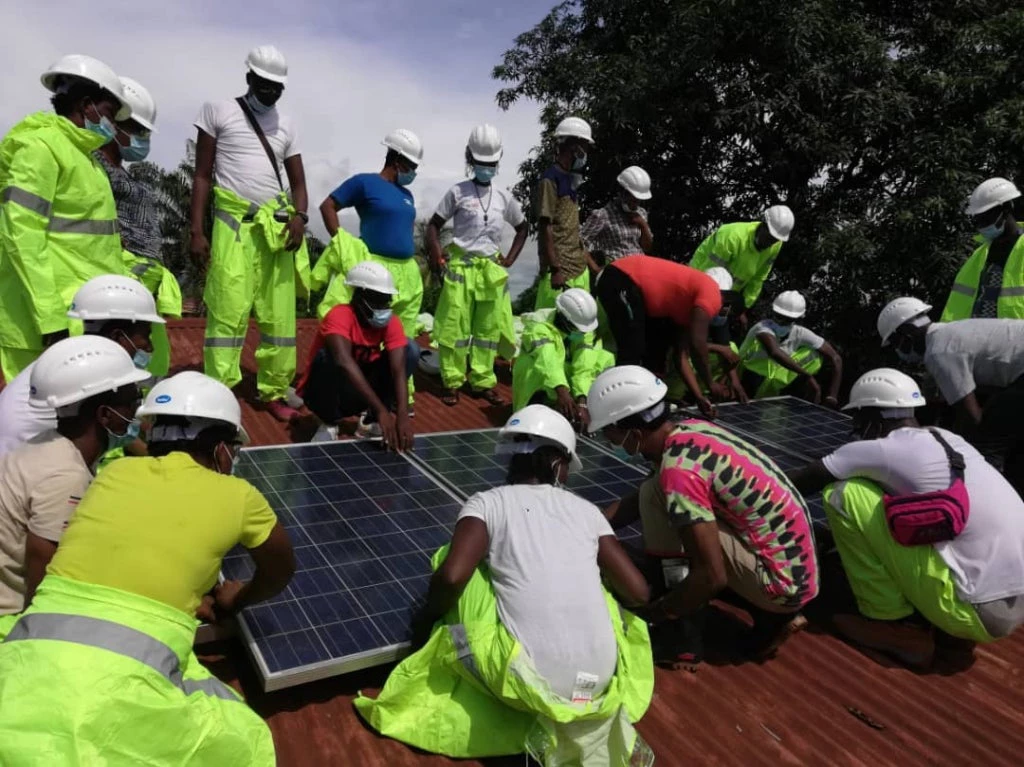 Seynabou Ndiaye works in the control tower. She is an air traffic controller at Blaise Diagne international airport, Diamniadio, Senegal. ©Vincent Tremeau, World Bank
Seynabou Ndiaye works in the control tower. She is an air traffic controller at Blaise Diagne international airport, Diamniadio, Senegal. ©Vincent Tremeau, World Bank
The Western and Central Africa (WCA) region is home to an estimated half a billion people and more than 40% of the population is under the age of 15, as shown by the data from the United Nations Population 2030 report, making the youth one of the greatest assets of this region. The youth population is expected to grow further.For example, Mali’s youth population is projected to see a stunning 71% increase, while Nigeria’s one is expected to increase by approximately 60% between 2015-2030. Of course, in light of these facts alone, it is critical that all WCA countries fully harness this demographic dividend to support their economic development goals. Furthermore, the Fourth Industrial Revolution (4IR) and the rise of the digital economy, offer unprecedented development opportunities that did not exist before. However, even though these figures may seem promising, they can trigger significant challenges, if the governments do not accelerate their support to the youth population through enhanced opportunities for education, training and jobs.
Challenges
Today, the question on the minds of most policy makers and education experts is: What would it mean for the region to reimagine, realign, and recommit to Africa’s youth skills development? There is one obvious answer – “business as usual” is not an option!
Western and Central Africa is a vast area of diverse landscapes, cultures and languages. The region is also facing significant challenges such as high-levels of youth unemployment, chronic gender gaps in post-basic education attainment and workforce participation, threat of climate change, high levels of poverty, vulnerability and inequality – all exacerbated by the current pandemic. In addition, more than 70% of the region’s population is living in fragile, conflict and violence-affected countries.
Although the region has made significant progress in access to basic education (high gross enrollment rate), several challenges remain. These include, among others, too few youth with access to high quality and market relevant skills development programs. Additional challenges stem from insufficient data on labor market and employability; inadequate financing; and weak governance and quality assurance systems. Although WCA countries are experiencing a fast rate of digital transformation, there is a persistent and wide skills gap, especially in advanced digital qualifications, compared to basic and intermediate digital skills. The 4IR is reshaping the demand for skills, requiring well-qualified engineers, technicians, information and communication technology (ICT) specialists with adaptable, strong cognitive and socio-emotional skills, in addition to their technical skills.
A highly skilled labor force in a thriving digital ecosystem will increase the ability of WCA countries to compete on a global scale, by attracting investments; promoting innovation in service delivery and value-addition to natural resources; as well as generating knowledge-intensive activities.

Solutions
To address these challenges, the World Bank is developing a Regional Education Strategy (2022-2025) with a key focus on skills development and young women’s empowerment. This Education Strategy derives from the recently-launched multi-sectoral WCA Regional Strategy (2021-2025). Moreover, the document is anchored in a strong regional consultative approach, which ensures close engagement with relevant regional stakeholders (i.e. governments, development partners, civil society, youth organizations, the private sector, and key influencers).
Drawing from regional and global experiences, the WCA Education Strategy is identifying transformative, scalable and results-oriented models and interventions for improving youth skills development in WCA, including the following critical issues:
- The use of educational technology (EdTech) and innovative pedagogical approaches (e.g. EdoBest in Nigeria);
- Hands-on practical training, entrepreneurial and industry engagement models (e.g. Sèmè City in Benin);
- Sustainable financing and incentives to improve access for vulnerable youth (e.g. Skills Development Fund in Sierra Leone);
- Modernization of governance of sector systems and institutions (e.g. Workforce Singapore in Singapore);
- Public-Private partnership for skills development and higher education (e.g. Ashesi University in Ghana);
- Regional collaborations (e.g. Africa Centers of Excellence).
Building on key lessons from the COVID-19 crisis, digital technology will be playing a crucial role in support of innovative curricula as well as pedagogical practices in the education and training sector. However, we need to say that technological solutions are useful only if they are available in an equitable and inclusive manner. It is therefore vital that investments in infrastructure (including energy and connectivity) emphasize inclusiveness to eliminate disparities across the region and within the countries. All children and youth deserve to fully benefit from these technological solutions.
A call to action
Today, more than ever before, African governments have the power to adopt and implement the right solutions to unlock the potential of Africa’s youth. As strong commitment combined with ownership and strategic partnership can make a difference at all levels, all regional leaders in both the private and public sectors must work together. We all must strive to build not only relevant and resilient skills development systems – across both Technical and Vocational Education and Training (TVET) and Higher Education, but also equip the youth, especially young women, with the skills and tools needed in a world where the nature of work is rapidly and constantly changing. The opportunity costs of not undertaking these reforms could be incredibly high and we cannot afford to fail now!







Join the Conversation